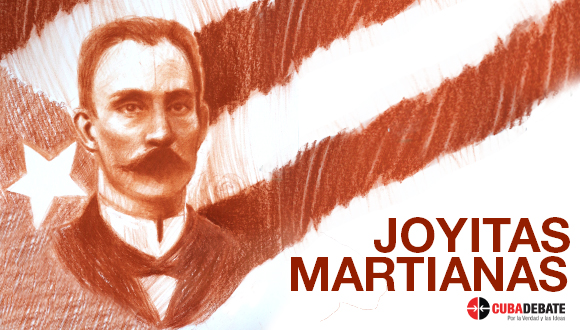"...since living is not pleasure; since to get to everything it is necessary to walk for what leads to it, fulfill your duty, live life, go"
("Mexican Theater", Universal Magazine, August 4, 1875)
JANUARY 28
On
January 28, 1853,
at 41 Paula Street, today Leonor Pérez 314, in Old Havana, José Martí Pérez was born, the eldest son of Spanish citizens Mariano Martí and Leonor Pérez.
In
1876
Martí founded the Alarcón Society, of dramatic authors from Mexico.
In
1882
, his Constant Section was published in La Opinión Nacional, of Caracas, in which he commented on the open struggle that exists between Buddhism and Christianity in Japan;
and the succession of Baron von Haymerié in the Austrian Ministerial Presidency by Count von Kalmoky, of whom Martí says: “He has distinguished himself greatly by the opportunity of his words, and by his silence.
He knows how to see and knows how not to say, which is sometimes better than knowing how to say."
Five years later
, La Nación, from Buenos Aires, published a work by Martí, in which he dealt with the Christ of the Hungarian painter Michael Munkacsy.
He details: “Today we will go where New York goes, to see the Christ of the Hungarian painter Munkacsy.
"Eljem, eljem!"
What does it mean to live?
–Scream painters, poets, journalists, clergymen, politicians, wherever Munkacsy appears, who is now visiting New York, as if to help the fame and profit of his painting. ”
In
1893
in the newspaper "Patria" his work entitled Blind and disloyal was published.
He notes: “Politics is the truth.
Politics is knowledge of the country, anticipation of unfortunate conflicts or unavoidable accommodations between its various or opposing factors, and the duty to summon the necessary forces when the patent impossibility of accommodation causes and justifies the conflict.
What is in the heart, what is taken from the heart of the country, is said with a force that awakens the sleeping mountains, the mountains that are already stretching and embellishing and the merit belongs to the truth, and not to who says."
That same day and year
the section En Casa is published in Patria.
And in
1895
Martí wrote a letter to Juan Gualberto Gómez in which he asked for a response to which he had explained his situation and what could and should be done.
He makes clear to him: “I wait very restlessly.
Without that foundation, she would be off the hook.
I'm still safe with her."
